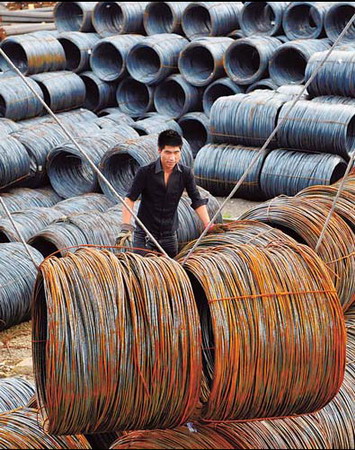Economy
Energy-saving drive set to push up steel prices
By Liu Yiyu (China Daily)
Updated: 2010-09-08 10:52
 |
Large Medium Small |
|
 |
|
A worker moves coils of steel wire at a steel market in Shenyang, Liaoning province. A growing number of Chinese steel mills have cut or stopped production as the sector strives to meet year-end energy saving targets. [Sheng Li / Reuters] |
BEIJING - Steel prices are likely to rise in China in the fourth quarter as power restrictions trim production capacity due to the country's urgent call to meet energy-saving targets while new construction projects will push up market demand, industry analysts said.
Hebei province, which accounts for a quarter of the country's total steel production capacity, shut 57 blast furnaces and production lines from Sept 4 after local governments restricted power supplies in order to meet efficiency targets by the end of this year, according to Beijing-based consulting company Mysteel.com.
Wu'an, the second-largest steelmaking city in Hebei, cut power supplies to steelmakers from Sept 4 for about 20 days, Mysteel.com said. Wu'an had a production capacity of more than 20 million metric tons in 2009, according to Mysteel.com.
"This strong-arm approach is becoming a trend in the energy-intensive steel industry and will spread to other places in Hebei, the province with the biggest steel output," said Xu Xiangchun, director of Mysteel.com.
Thirty steel mills in Tangshan, including a production base of Shougang Group, were ordered to halve their steel output over the next four months, the local government said in a notice on Monday.
Hebei's move to restrict power supplies to local steelmakers comes after its first-half energy intensity figure only decreased 1.35 percent, far from its target of 4 percent.
The eastern province of Jiangsu will also ration its power supply to local steelmakers from 12 pm to 8 am through to the end of this month and steelmakers in Zhejiang province will only be supplied power from 10 pm to 8 am every day, Mysteel.com said.
These measures are likely to trim this year's annual output by 8 percent, according to an estimate by Guojin Securities.
China has pledged to reduce its energy intensity, the amount of fuel needed to generate each unit of gross domestic product (GDP), by 20 percent from 2005 to 2010. But the country's energy intensity edged up 0.09 percent year-on-year in the first half of 2010, after falling 14.38 percent from 2006 to 2009.
Therefore, China took tougher measures than before to eliminate energy-intensive production by restricting steelmakers' power consumption.
But these short-term control measures will cause great fluctuations in the industry and lead to market volatility, according to Xu.
The Shanghai Futures Exchange benchmark January rebar contract was up 0.5 percent at 4,570 yuan per ton on Tuesday after it rose 3.9 percent on Monday.
"Power restrictions have a more direct impact on curbing steel production," said Liu Yuanrui, an industry analyst at Changjiang Securities.
And power cuts obviously have a bigger impact on smaller mills, as bigger players in the industry have a greater capacity to generate their own power, industry analysts said.
The steel industry accounts for one-sixth of China's total energy consumption and will have to cut its output by at least 7.2 percent during the second half of this year in order to meet the country's energy-saving target, according to an estimate by Huatai United Securities.
Steel output in China already dropped by 3.9 percent to 51.7 million tons in July from a month ago, hitting a five-month low, according to the China Iron and Steel Association.




